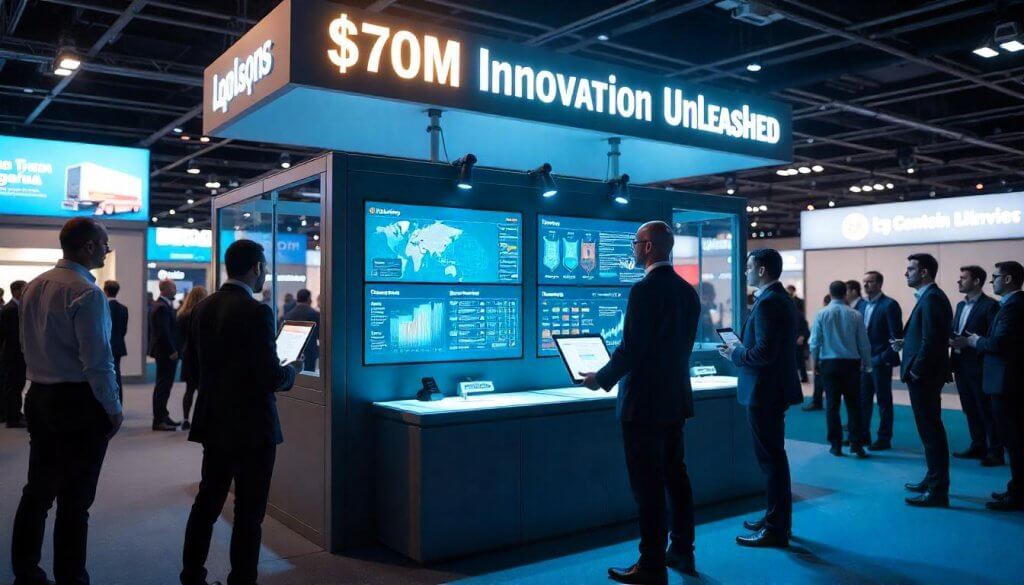Lojistik teknolojisi sektörü yeniliklerin yuvasıdır ve 2024 yılında gerçekleşen $70 milyonluk stratejik bir satın alma, sektörün gidişatını yeniden tanımlamıştır. Bu anlaşma, bir lojistik SaaS sağlayıcısı olan "FreightFlow "un, tedarik zinciri çözümlerini geliştirmek için gerçek zamanlı bir analitik girişimi olan "TrackPulse "u satın almasını içeriyordu. Bu stratejik satın alma, gelişmiş takip ve otomasyonu entegre ederek FreightFlow'un pazardaki konumunu ve ölçeklenebilirliğini güçlendirdi. Bu makalede anlaşmanın yapısı, entegrasyon stratejisi ve lojistik teknoloji endüstrisi üzerindeki daha geniş etkisi, son dönemdeki sektör birleşme ve satın alma faaliyetlerinden elde edilen trendler ışığında analiz edilmektedir.
Lojistik Teknolojisinde Stratejik Satın Alma Mekaniği
Lojistik teknolojisinde stratejik bir satın alma tipik olarak teknolojiyi güçlendirmeyi, pazar erişimini genişletmeyi veya operasyonel sinerjiler elde etmeyi amaçlar. Birleşmelerden farklı olarak satın almalar, genellikle tescilli teknoloji veya müşteri tabanı elde etmek için bir şirketin diğerini bünyesine katmasını içerir. Dijital navlun platformları ve yapay zeka tarafından yönlendirilen bu sektörde, bu tür anlaşmalar 2030 yılına kadar 7,2% YBBO ile büyümesi öngörülen bir pazarda rekabetçi kalmak için kritik öneme sahiptir.
FreightFlow'un TrackPulse'ı $70 milyona satın alması Goldman Sachs tarafından danışmanlık hizmeti verilerek nakit ve hisse senedi karışımıyla finanse edildi. Anlaşma, FreightFlow'un $50 milyon ARR'sini ve TrackPulse'ın $20 milyon ARR'sini kaldıraç olarak kullanarak $350 milyon değerinde birleşik bir varlık yarattı. FreightFlow, TrackPulse'ın yapay zeka odaklı analitiğini satın alarak platformunu geliştirmeyi ve $3,8 trilyonluk lojistik pazarından daha büyük bir pay almayı hedefledi.
FreightFlow'dan $70 Milyon Dolarlık Stratejik Satın Alma
Yük yönetimi için bir SaaS platformu olan FreightFlow, tedarik zincirlerinde artan görünürlük talebini karşılamak için gerçek zamanlı gönderi takibi konusunda uzman TrackPulse'ı satın aldı. 2.000 müşteriye hizmet veren FreightFlow, E2open gibi oyuncuların rekabetiyle karşı karşıyaydı. TrackPulse'ın 500 müşterilik tabanı ve yapay zeka araçları bir çözüm sunuyordu. 2024 yılında gerçekleşen stratejik satın alma, FreightFlow'un 18 ay içinde 20% ARR artışı hedefleyerek gelişmiş analitiği entegre etmesini sağladı.
Satın Alma Anlaşmasının Yapılandırılması
$70 milyonluk anlaşmanın $50 milyonu JPMorgan Chase'den alınan borçla finanse edilen nakit ve $20 milyonu FreightFlow hisselerinden oluştu. TrackPulse'ın değerlemesinde 5:1 LTV-CAC oranı ve 95% elde tutma oranı etkili oldu. Satın alma, TrackPulse'ın liderliğini bir FreightFlow bölümü olarak koruyarak uzmanlık sürekliliğini sağladı. Bu yapı, 2020 ile 2024'ün 3. çeyreği arasında $718 milyar değerinde 1.951 anlaşmanın gerçekleştiği ve anlaşma başına ortalama $368 milyonun düştüğü sektör trendleriyle uyumlu hale geldi.
Entegrasyon ve Sinerjinin Gerçekleştirilmesi
FreightFlow entegrasyon için $15 milyon yatırım yaptı ve üç alana odaklandı. İlk olarak, $7 milyon TrackPulse'ın analitiğini FreightFlow'un platformuyla birleştirerek takip gecikmesini 40% azalttı. İkinci olarak, $5 milyon API'leri birleştirerek operasyonları kolaylaştırdı ve maliyetleri 10% azalttı. Son olarak, $3 milyon Kuzey Amerika ve Avrupa'ya satışları genişleterek 500 yeni müşteriyi hedefledi. Bu çabalar 2026 yılına kadar $10 milyon maliyet sinerjisi ve $20 milyon gelir sinerjisi hedefliyor.
Lojistik Teknolojisinde Stratejik Satın Almalar Neden Gelişiyor?
Lojistik teknolojisinin veri ve otomasyona olan bağımlılığı, onu stratejik satın almalar için olgunlaştırıyor. İşte bu yaklaşımın sektörde öne çıkmasının nedeni.
Teknolojik Yeteneklerin Geliştirilmesi
TrackPulse'un yapay zeka analitiğini satın almak, FreightFlow'un önemli bir müşteri talebi olan gerçek zamanlı görünürlük sunmasını sağladı. Entegre platform, sipariş doğruluğunu 15% artırarak E2open'ın ticaret ve tedarik zinciri teknolojisini birleştiren BluJay Solutions'ı $2 milyar dolara satın alması gibi anlaşmaları yansıttı. Stratejik satın almalar, ağır Ar-Ge maliyetleri olmadan hızlı teknoloji yükseltmelerine olanak tanır.
Pazar Erişiminin Genişletilmesi
TrackPulse'un müşteri tabanı, FreightFlow'un perakende ve üretim alanlarına erişimini genişleterek gelirlerini çeşitlendirdi. Bu satın alma, pazar genişletme hedefleri doğrultusunda 2020'den 2024'ün 3. çeyreğine kadar 1.432 anlaşmada $460 milyar dolarlık birleşme ve satın almanın gerçekleştiği sektör trendleriyle uyumlu hale geldi. Bu genişleyen ayak izi, FreightFlow'un C.H. Robinson gibi rakipleri karşısındaki konumunu güçlendirdi.
Operasyonel Sinerjilerin Elde Edilmesi
Entegrasyon, FreightFlow'un operasyonlarını kolaylaştırarak API fazlalıklarını ve maliyetleri azalttı. Uber Freight'in tedarik zinciri verimliliğini optimize eden Transplace'i satın almasına benzer şekilde, FreightFlow'un anlaşması da operasyonel giderleri azaltarak sermayeyi inovasyon için serbest bıraktı. Bu sinerjiler, verimliliğin marjları artırdığı bir sektörde kritik önem taşıyor.
Satın Alma FreightFlow'u Nasıl Dönüştürdü?
$70 milyonluk stratejik satın alma, FreightFlow'un operasyonlarını ve rekabet gücünü yeniden şekillendirerek somut sonuçlar sağladı.
Gelişmiş Platform Yetenekleri
$7 milyon platform entegrasyonu, birleşik bir SaaS çözümü oluşturarak sevkiyat gecikmelerini 20% azalttı. Büyük bir perakendeci geliştirilmiş platformu benimseyerek ARR'yi 8% artırdı. TrackPulse'un analizlerinden yararlanan FreightFlow, DHL'in e-ticaret iadeleri için Inmar'ı satın almasına benzer şekilde lojistik teknolojisi için yeni bir ölçüt belirledi.
Operasyonel Verimlilik Kazanımları
$5 milyon operasyonel düzen API'leri konsolide etti ve sunucu maliyetlerini 10% azalttı. Bu verimlilik, FreightFlow'un orantılı maliyet artışları olmadan ölçeklenmesini ve ayda 1.000 ek gönderiyi desteklemesini sağladı. Bu tür kazanımlar, otomasyon ve bulut çözümlerinin birleşme ve satın alma değerini artırdığı sektör trendlerini yansıtıyor.
Küresel Pazar Genişlemesi
$3 milyon satış yatırımı Kuzey Amerika ve Avrupa'yı hedefleyerek altı ayda 300 müşteri ekledi. FreightFlow, platformunu GDPR uyumlu analitiklerle yerelleştirerek Avrupa'da 25% gelir artışı sağladı. Bu, A.P. Moller-Maersk'in küresel bağlanabilirliği artırmak için Siemens Logistics'i $325 milyona satın almasını yansıtıyor.

$70 Milyonluk Satın Almanın Piyasa Etkisi
FreightFlow'un stratejik satın alımı lojistik teknoloji ekosistemini etkileyerek trendleri ve rekabeti şekillendirdi.
Sektör Konsolidasyonunu Beslemek
Anlaşma, Kasım 2024'te sona eren altı ayda 71 işlemde $51,5 milyar dolarlık anlaşmayla lojistik teknolojisi birleşme ve satın alma dalgasına katkıda bulundu. Momentis Systems'ı 2024 yılında satın alan Aptean gibi firmalar da ERP yeteneklerini güçlendirmek için aynı yolu izledi. Bu konsolidasyon, pazar payını teknoloji odaklı oyuncular arasında yoğunlaştırıyor.
Yatırımcı İlgisini Çekmek
FreightFlow'un satın alma sonrası 50% değer artışı, 2024 yılında lojistik teknolojisine $200 milyar özel sermaye çekti. Aptean'ı destekleyen Clearlake Capital gibi yatırımcılar, FreightFlow'un $30 milyon sinerji hedefini bir ölçüt olarak gösterdi. Bu sermaye akışı, daha küçük firmaların stratejik satın almalar gerçekleştirmesini sağlıyor.
Gerçek Zamanlı Analitiğin Geliştirilmesi
TrackPulse'ın analitiklerinin entegrasyonu görünürlük için endüstri standartlarını yükseltti. XPO Logistics gibi rakipler, müşterilerin gerçek zamanlı verilere yönelik talepleri doğrultusunda benzer teknolojilere yatırım yaptı. Materials Handling Institute'a göre lojistik firmalarının 90%'si $1 milyon+ teknoloji yatırımı planlarken, bu trend inovasyonu hızlandırıyor.
Stratejik Satın Almalar Peşinde Koşan Lojistik Teknoloji Firmaları İçin Dersler
FreightFlow'un satın alınması, lojistik teknoloji şirketleri için eyleme geçirilebilir içgörüler sunuyor.
Hedef Tamamlayıcı Teknolojiler
FreightFlow'un TrackPulse'ın analitiğini satın alması, SaaS platformunu tamamlayarak müşteri değerini artırdı. Firmalar, Visma'nın 2024'te muhasebe entegrasyonu için MyCompanyFiles'ı satın alması gibi sinerjik teknolojiye sahip hedefler aramalıdır.
Sağlam Entegrasyon Planlayın
$15 milyonluk entegrasyon bütçesi sorunsuz bir uygulama sağladı. Vanderlande'in Siemens Logistics'i $325 milyona satın almasında görüldüğü gibi, şirketler teknoloji ve operasyonel uyum için kaynak ayırmalıdır.
Finansal Metrikleri Optimize Edin
FreightFlow'un 5:1 LTV-CAC oranı, anlaşmanın değerlemesini haklı çıkardı. Firmalar, $368 milyon ortalama anlaşma büyüklüğü sektör trendleriyle uyumlu olarak, finansman çekmek için 12 ayın altında bir CAC geri ödeme süresi gibi güçlü ölçütleri korumalıdır.
Müşteriyi Elde Tutmaya Öncelik Verin
FreightFlow, TrackPulse müşterilerinin 95%'sini açık iletişim sayesinde elinde tuttu. Firmalar, Echo Global Logistics'in $1 milyarlık satın alımından bir ders olarak, müşteri kaybını önlemek için entegrasyon sırasında müşteri deneyimine odaklanmalıdır.
Yüksek Büyüme Gösteren Pazarlardan Yararlanın
FreightFlow'un Kuzey Amerika ve Avrupa odağı, yüksek talep gören bölgelere yöneldi. Şirketler, Asya-Pasifik'in 7,2% CAGR'si gibi güçlü lojistik teknoloji benimsemesine sahip pazarları hedeflemelidir.
Stratejik Satın Almaların Zorlukları
Stratejik satın almalar risk taşır. FreightFlow'un $15 milyon gibi entegrasyon maliyetleri, sinerjilerin düşük performans göstermesi halinde mali durumu zorlayabilir. FreightFlow ve TrackPulse arasındaki kültürel uyumsuzluklar, ekipleri uyumlu hale getirmek için arabuluculuk gerektirdi. Ayrıca, UPS'in MNX Global Logistics'i satın almasında görülen bir zorluk olarak, platformlar birleştirilmezse müşteri çakışması riskleri ortaya çıkabilir. Firmalar başarıyı garantilemek için bu riskleri azaltmalıdır.
Lojistik Teknolojisinde Stratejik Satın Almaların Geleceği
FreightFlow'un $70 milyonluk anlaşması, stratejik satın almaların lojistik teknolojisindeki rolünün altını çiziyor. Yapay zeka ve otomasyonun etkisiyle pazarın 2027 yılına kadar $445,8 milyara ulaşacağı öngörüldüğünde, birleşme ve satın almalar hızlanacak. DHL'in GoGreen Plus'ında görüldüğü gibi API tabanlı entegrasyonlar ve sürdürülebilir lojistik gibi trendler anlaşmaları teşvik edecek. Firmalar ölçeklenebilirlik arayışına girdikçe, stratejik satın almalar inovasyonu ve pazar liderliğini destekleyecek.
Sonuç
$70 milyonluk stratejik satın alma, FreightFlow'u dönüştürerek gelişmiş analitik ve operasyonel verimlilik yoluyla $30 milyonluk sinerjiyi ortaya çıkardı,

 Lojistik Teknolojisi Sektöründe $70 Milyonluk Stratejik Satın Almanın Analizi">
Lojistik Teknolojisi Sektöründe $70 Milyonluk Stratejik Satın Almanın Analizi">

Yorumlar